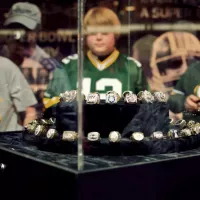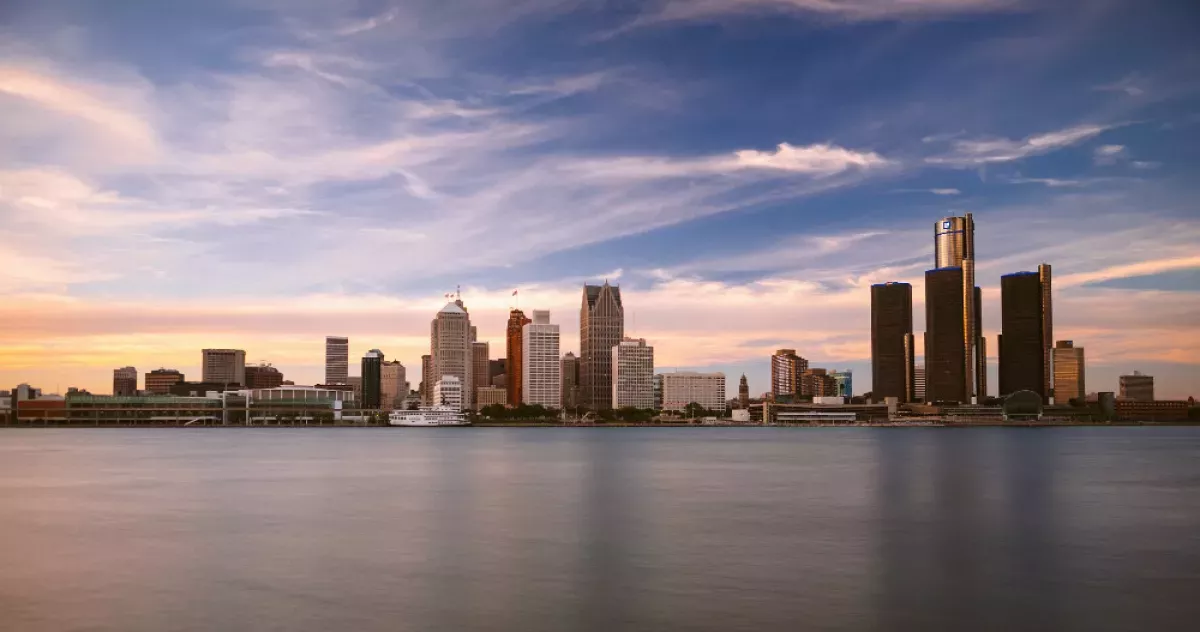Detroit, Michigan's most populous city, sits on the Detroit River opposite Windsor, Ontario, and is the largest U.S. city bordering Canada. As the seat of Wayne County, it held a population of 639,111 in 2020, ranking 26th in the U.S. The Metro Detroit area, home to 5.3 million, is the second-largest in the Midwest. Detroit is a major cultural hub, famed for its impact on music, art, architecture, and design, as well as its automotive and industrial heritage.
1903: Ford Motor Company Founded
In 1903, Henry Ford founded the Ford Motor Company, a pivotal event in Detroit's automotive history.
1907: Detroit River's Shipping Commerce
In 1907, the Detroit River facilitated the transport of 67,292,504 tons of shipping commerce, exceeding London and New York.
1910: Increase in African American Population
In 1910, Detroit's African American population was approximately 6,000 before a significant increase during the economic boom following World War I.
1915: Ku Klux Klan Revival in Detroit
In 1915, Detroit became a site for the urban revival of the Ku Klux Klan (KKK), marking a period of increased racial and ethnic tension.
1920: Detroit Becomes Fourth-Largest City
By 1920, Detroit had become the fourth-largest city in the United States due to the booming auto industry.
1920: Prohibition and Smuggling
Starting in 1920, the prohibition of alcohol resulted in the Detroit River becoming a major conduit for smuggling of illegal Canadian spirits.
1922: Nederlander Organization Origin
In 1922, the Nederlander family started the Nederlander Organization with the purchase of the Detroit Opera House.
1924: America's Thanksgiving Parade
Held since 1924, America's Thanksgiving Parade is one of the nation's largest and is held annually in Detroit.
1925: Ossian Sweet Incident
In 1925, African American physician Ossian Sweet faced a hostile mob protesting his move into a white neighborhood; he and his associates were later tried for murder after a mob member was killed.
1930: Significant Growth of African American Population
By 1930, Detroit's African American population grew to over 120,000 due to an economic boom and migration.
1932: Eddie Tolan wins two gold medals at Summer Olympics
In 1932, Eddie "The Midnight Express" Tolan from Detroit won the 100- and 200-meter races and two gold medals at the 1932 Summer Olympics, marking a significant achievement for the city's athletes.
1933: End of Prohibition
In 1933, the end of prohibition reduced the prominence of the Detroit River as a smuggling route for Canadian spirits.
July 24, 1934: Record High Temperature
On July 24, 1934, Detroit recorded a record high temperature of 105 °F (41 °C).
October 1935: Tigers Win World Series
In October 1935, the Detroit Tigers won the World Series, marking a significant achievement in the city's sports history.
December 1935: Lions Win NFL Championship
In December 1935, the Detroit Lions won the NFL championship, contributing to Detroit's reputation as the "City of Champions".
1935: Michigan Chronicle founded
In 1935, the Michigan Chronicle, an African-American weekly newspaper, was founded in Detroit.
April 1936: Red Wings Win Stanley Cup
In April 1936, the Detroit Red Wings won the Stanley Cup, solidifying Detroit's title as the "City of Champions".
1936: Defeat of the Black Legion
In 1936, the Black Legion, a vigilante group active in Detroit, was defeated after prosecutions following the kidnapping and murder of Charles Poole.
1937: Joe Louis wins heavyweight championship
In 1937, Joe Louis won the heavyweight championship of the world, bringing fame and recognition to Detroit.
1940: Restrictive Covenants in Detroit
In 1940, 80% of Detroit deeds contained restrictive covenants, prohibiting African Americans from buying houses, contributing to racial segregation.
1940: Huron-Clinton Metropolitan Authority Created
In 1940, the Huron-Clinton Metropolitan Authority was created by the citizens of Southeast Michigan to serve as a regional park system.
1941: Migration to Detroit
From 1941 to 1943, 400,000 people migrated to Detroit due to expanded jobs caused by the defense buildup in World War II.
1941: Streetcar Frequency on Woodward Avenue
In 1941, at peak times, a streetcar ran on Woodward Avenue every 60 seconds, showcasing the city's robust public transportation at the time.
1942: Red Wings Win Stanley Cup
In 1942-43, the Detroit Red Wings won the Stanley Cup, marking a significant achievement in the city's sports history.
June 1943: Detroit Race Riot
In June 1943, the Detroit race riot resulted in 34 deaths, hundreds injured, and significant property damage, highlighting racial tensions.
1944: Unsuccessful Olympic bid
In 1944, Detroit made an unsuccessful bid to host the Summer Olympics. This was the first of seven unsuccessful bids.
1945: Tigers Win World Series
In 1945, the Detroit Tigers won the World Series, marking a significant achievement in the city's sports history.
1949: J. W. Westcott II vessel began service
In 1949, the J. W. Westcott II vessel began service as a floating post office, serving lake freighters along the Detroit River and using the exclusive ZIP Code 48222.
1949: Red Wings Win Stanley Cup
In 1949-50, the Detroit Red Wings won the Stanley Cup, marking a significant achievement in the city's sports history.
1950: Detroit's Population Share in Michigan
In 1950, Detroit held about one-third of the state's population, marking a significant share of Michigan's residents.
1950: Detroit's Peak Population
In 1950, Detroit reached its peak population of 1,849,568, making it the fifth-largest city in the United States.
1950: Detroit Ranks as Fourth-Largest City in U.S.
In 1950, Detroit was the fourth-largest city in the US, behind New York, Chicago, and Philadelphia, before its population decline.
1951: Red Wings Win Stanley Cup
In 1951-52, the Detroit Red Wings won the Stanley Cup, marking a significant achievement in the city's sports history.
1952: Unsuccessful Olympic bid
In 1952, Detroit made an unsuccessful bid to host the Summer Olympics. This was the second of seven unsuccessful bids.
1952: Lions Win NFL Title
In 1952, the Detroit Lions won the NFL title, marking a significant achievement in the city's sports history.
1953: Red Wings Win Stanley Cup
In 1953-54, the Detroit Red Wings won the Stanley Cup, marking a significant achievement in the city's sports history.
1954: Red Wings Win Stanley Cup
In 1954-55, the Detroit Red Wings won the Stanley Cup, marking a significant achievement in the city's sports history.
1956: Unsuccessful Olympic bid
In 1956, Detroit made an unsuccessful bid to host the Summer Olympics. This was the third of seven unsuccessful bids.
1956: Removal of Last Streetcar Line
In 1956, Detroit's last heavily used electric streetcar line on Woodward Avenue was removed and replaced with buses, ending an era of streetcar transportation.
1957: Louis Miriani last Republican mayor
In 1957, Louis Miriani served as Detroit's last mayor from the Republican Party, serving until 1962.
1957: Lions Win NFL Title
In 1957, the Detroit Lions won the NFL title, marking a significant achievement in the city's sports history.
1960: Unsuccessful Olympic bid
In 1960, Detroit made an unsuccessful bid to host the Summer Olympics. This was the fourth of seven unsuccessful bids.
1962: End of Louis Miriani's mayorship
In 1962, Louis Miriani's tenure as mayor ended, marking the end of the last Republican mayor in Detroit.
June 1963: Martin Luther King Jr.'s Speech in Detroit
In June 1963, Rev. Martin Luther King Jr. delivered a major civil rights speech in Detroit, foreshadowing his "I Have a Dream" speech.
1963: Lowest Annual Precipitation
In 1963, Detroit recorded its lowest annual precipitation at 20.49 inches (520 mm).
1964: Unsuccessful Olympic bid
In 1964, Detroit made an unsuccessful bid to host the Summer Olympics. This was the fifth of seven unsuccessful bids.
1964: Federal Civil Rights Laws
In 1964, significant federal civil rights laws were enacted, aiming to address longstanding inequities.
1965: Federal Civil Rights Laws
In 1965, further federal civil rights laws were enacted, aiming to address longstanding inequities.
July 1967: Twelfth Street Riot
In July 1967, the Twelfth Street riot in Detroit resulted in 43 deaths, hundreds injured, thousands of arrests, and widespread destruction.
1967: Riots
In 1967 the riots may have contributed to white families leaving the city of Detroit.
1968: Unsuccessful Olympic bid
In 1968, Detroit made an unsuccessful bid to host the Summer Olympics. This was the sixth of seven unsuccessful bids.
1968: Tigers Win World Series
In 1968, the Detroit Tigers won the World Series, marking a significant achievement in the city's sports history.
August 18, 1970: NAACP Lawsuit Against Michigan Officials
On August 18, 1970, the NAACP filed a lawsuit against Michigan state officials, alleging de facto public school segregation.
1972: Unsuccessful Olympic bid
In 1972, Detroit made an unsuccessful bid to host the Summer Olympics. This was the seventh of seven unsuccessful bids.
1972: Motown Moves to Los Angeles
In 1972, Gordy moved Motown to Los Angeles to pursue film production, signifying a change in the music industry landscape.
November 1973: Coleman Young Elected Mayor
In November 1973, Coleman Young was elected as Detroit's first black mayor, marking a significant moment in the city's history.
1973: Coleman Young elected first black mayor
In 1973, Coleman Young was elected as the first black mayor of Detroit, marking a significant moment in the city's history.
1973: Gasoline Crisis Impact on Auto Industry
The gasoline crisis of 1973 affected the auto industry as buyers chose smaller, more fuel-efficient cars made by foreign makers.
February 27, 1974: U.S. Supreme Court Takes Up Milliken v. Bradley
On February 27, 1974, the U.S. Supreme Court took up the case of Milliken v. Bradley, concerning school desegregation.
1974: High Number of Homicides
In 1974, Detroit recorded 714 homicides, highlighting the city's struggle with crime.
1976: Federal Funding for Transit System
In 1976, the federal government offered $600 million for a regional rapid transit system, but conflicts prevented the region from securing the funding.
1977: Renaissance Center Opens
In 1977, the Renaissance Center, a mixed-use complex, opened in an attempt to keep businesses in downtown Detroit.
1979: Gasoline Crisis Impact on Auto Industry
The gasoline crisis of 1979 affected the auto industry as buyers chose smaller, more fuel-efficient cars made by foreign makers.
1980: Metro Times founded
In 1980, the Metro Times, a weekly publication covering news, arts & entertainment, was founded.
1982: Detroit Grand Prix held
In 1982, the Detroit Grand Prix was held at the Detroit street circuit. This marked the beginning of a series of races that would take place in the city until 1988.
January 21, 1984: Record Low Temperature
On January 21, 1984, Detroit recorded a record low temperature of −21 °F (−29 °C).
1984: Tigers Win World Series
In 1984, the Detroit Tigers won the World Series, marking a significant achievement in the city's sports history.
1987: People Mover completed
In 1987, the elevated rail system known as the People Mover was completed, providing daily service around a 2.94-mile loop downtown.
1988: Detroit Grand Prix held
In 1988, the Detroit Grand Prix was held at the Detroit street circuit, marking the final year of the race being held in the city.
1989: Pistons Win NBA Title
In 1989, the Detroit Pistons won the NBA title, marking a significant achievement in the city's sports history.
1990: Pistons Win NBA Title
In 1990, the Detroit Pistons won the NBA title, marking a significant achievement in the city's sports history.
1990: Increase in Latino Population
In the 1990s, immigration from Jalisco significantly increased Detroit's Latino population.
1993: Coleman Young Retires
In 1993, Coleman Young retired as Detroit's longest-serving mayor, deciding not to seek a sixth term.
January 19, 1994: Record Low Maximum Temperature
On January 19, 1994, Detroit recorded a record low maximum temperature of −4 °F (−20 °C).
1996: Casino Gambling Referendum
In 1996, a referendum to allow casino gambling in Detroit passed, paving the way for new entertainment venues.
1996: Red Wings Win Stanley Cup
In 1996-97, the Detroit Red Wings won the Stanley Cup, marking a significant achievement in the city's sports history.
1997: Red Wings Win Stanley Cup
In 1997-98, the Detroit Red Wings won the Stanley Cup, marking a significant achievement in the city's sports history.
1999: Temporary Casinos Open
In 1999, several temporary casino facilities opened in Detroit, marking the start of the city's casino industry.
1999: Kiss Movie
In 1999, the group Kiss emphasized the city's connection with rock in the movie produced this year.
2000: Most Segregated City
In 2000, Detroit was ranked as the most segregated metropolitan area in the United States.
2000: Median Household Income
In 2000, Detroit's estimated median household income was $29,526, highlighting economic challenges.
2000: MAC Basketball Tournament Move
In 2000, the MAC Basketball Tournament moved permanently to Cleveland, Ohio.
2000: Request for investigation by United States Justice Department
In 2000, the city of Detroit requested an investigation by the United States Justice Department into the Detroit Police Department, which was concluded in 2003.
2000: Population Decline Begins
The census between 2000 and 2010 marked a period of dramatic population decline, showing a 25% decrease.
2001: Jewish Population
In 2001, approximately 103,000 Jews, making up about 1.9% of the population, resided in the Detroit area.
2001: International Riverfront Redevelopment
In 2001, the first portion of the International Riverfront redevelopment was completed as a part of the city's 300th-anniversary celebration.
2001: Red Wings Win Stanley Cup
In 2001-02, the Detroit Red Wings won the Stanley Cup, marking a significant achievement in the city's sports history.
2003: Compuware Headquarters
In 2003, Compuware completed its world headquarters in downtown Detroit.
2003: Conclusion of Justice Department Investigation
In 2003, the United States Justice Department concluded its investigation into the Detroit Police Department, leading to a major reorganization of the department.
2004: Campus Martius Opens
In 2004, Campus Martius, a reconfiguration of downtown's main intersection as a new park, was opened.
2004: Pistons Win NBA Title
In 2004, the Detroit Pistons won the NBA title, marking a significant achievement in the city's sports history.
2004: MAC Football Championship Game at Ford Field
Since 2004, the MAC Football Championship Game has been played at Ford Field, drawing thousands of fans annually.
2005: Hosted 2005 MLB All-Star Game
In 2005, Detroit hosted the MLB All-Star Game, marking a significant sporting event for the city.
August 1, 2006: Record High Minimum Temperature
On August 1, 2006, Detroit recorded a record high minimum temperature of 80 °F (27 °C).
2006: Hosted Super Bowl XL and 2006 World Series
In 2006, Detroit hosted Super Bowl XL and the World Series, showcasing the city's capacity to host major sporting events.
2006: Ernst & Young Office Building Completion
In 2006, Ernst & Young completed its office building at One Kennedy Square in downtown Detroit.
2006: Lithuanian Hall Reopening
In 2006, the renovated Lithuanian Hall reopened in Detroit's Southwest side, specifically in the West Vernor area, highlighting the presence of a Lithuanian community in the city since the World War II era.
2006: $9 Billion Invested
Since 2006, $9 billion has been invested in downtown and surrounding neighborhoods.
2006: $1.3 Billion in Restorations and New Developments
Two years earlier, downtown reported $1.3 billion in restorations and new developments which increased the number of construction jobs in the city.
2007: Downtown Resident Demographics
A 2007 study found that Downtown's new residents are predominantly young professionals (57% are ages 25 to 34, 45% have bachelor's degrees, and 34% have a master's or professional degree).
2007: Drug Related Homicides
According to a 2007 analysis, Detroit officials note about 65 to 70 percent of homicides in the city were drug related, with the rate of unsolved murders roughly 70%.
2007: Violent Crime Rates
From 2007 to 2011, violent crime in Detroit has not declined as much as the national average.
2007: Permanent Casinos Open
In 2007 and 2008, permanent downtown casinos with hotels opened in Detroit, expanding the city's entertainment options.
2007: Hosted WrestleMania 23
In 2007, Detroit hosted WrestleMania 23, a major professional wrestling event, adding to the city's diverse portfolio of hosted events.
2007: Downtown Detroit Best City Neighborhood for Retirement
In 2007, Downtown Detroit was recognized as the best city neighborhood in which to retire among the United States' largest metro areas by CNNMoney editors.
2007: Red Wings Win Stanley Cup
In 2007-08, the Detroit Red Wings won the Stanley Cup, marking a significant achievement in the city's sports history.
April 2008: $300 Million Stimulus Plan Announced
In April 2008, Detroit announced a $300 million stimulus plan to create jobs and revitalize neighborhoods, financed by city bonds and paid for by earmarking about 15% of the wagering tax.
September 2008: Mayor Kwame Kilpatrick Resigns
In September 2008, Mayor Kwame Kilpatrick resigned from office after serving for six years, due to felony convictions.
2008: Casino resort hotels established operations
By 2008, three major casino resort hotels established operations in Detroit, contributing to the city's redevelopment efforts.
2008: Bonds Issued for Demolishing Blighted Properties
In 2008, the city issued bonds to fund the demolition of blighted properties, indicating efforts to catalyze regional growth and rehabilitation.
2008: Violent Crime Drop
In 2008, the rate of violent crime in Detroit dropped by 11%, though violent crime remained high.
April 2009: Hosted NCAA Final Four
In April 2009, Detroit hosted the NCAA Final Four, solidifying its reputation as a major sporting event host.
June 2009: Michigan State University College of Osteopathic Medicine opens satellite campus
In June 2009, the Michigan State University College of Osteopathic Medicine, based in East Lansing, opened a satellite campus at the Detroit Medical Center, expanding medical education opportunities in the city.
November 2009: Referendum for City Council Elections
In November 2009, a referendum led to a change in the city council election process, with seven council members to be elected from districts beginning in 2013, while two would continue to be elected at-large.
2009: Parcel Survey Findings
A 2009 parcel survey found that about a quarter of residential lots in Detroit were undeveloped or vacant, and about 10% of the city's housing was unoccupied, highlighting the city's vacancy issues.
2009: Record low scores on national tests
Around 2009, Detroit traditional public schools scored a record low on national tests, while the publicly funded charter schools performed even worse than the traditional public schools.
2009: Household Income Falls
From 2000 to 2009, Detroit's estimated median household income fell from $29,526 to $26,098, indicating economic hardship.
2009: Charter schools as popular as district schools
In 2009, Detroit had about as many students in charter schools as in district schools, indicating a significant presence of charter schools in the city's education landscape.
December 30, 2010: DMC becomes part of Vanguard Health Systems
On December 30, 2010, DMC formally became a part of Vanguard Health Systems as a for-profit corporation, with Vanguard agreeing to invest nearly $1.5 billion in the DMC complex.
2010: Decreased Segregation
According to the 2010 census, segregation in Detroit decreased in absolute and relative terms, with an increase in integrated neighborhoods.
2010: High Poverty Rates
As of 2010, Detroit's mean income was below the U.S. average, with one in three residents living in poverty, making it one of the poorest big cities in the country.
2010: Hispanic Population Growth
By 2010, Detroit had 48,679 Hispanics, including 36,452 Mexicans, marking a 70% increase since 1990.
2010: Derelict Houses Razed
In 2010, Detroit began demolishing derelict houses, razing 3,000 of the total 10,000, to deal with vacancy issues, but the resulting low density created a strain on the city's infrastructure.
2010: Quicken Loans Relocation
In 2010, Quicken Loans relocated its world headquarters and 4,000 employees to downtown Detroit.
2010: G.R. N'Namdi Gallery Opening
In 2010, the G.R. N'Namdi Gallery opened in a 16,000-square-foot complex in Midtown, enhancing Detroit's cultural landscape.
2010: Census Data Released
In 2010, the United States census data showed Detroit as the center of a three-county urban area with a population of 3,734,090, a six-county metropolitan statistical area with 5,322,219 residents, and a nine-county Combined Statistical Area with 5.3 million people.
2010: Significant Population Decline
The census from 2000 to 2010 marked a period of dramatic population decline, showing a 25% decrease.
2011: Segregation Op-Ed
A 2011 op-ed in The New York Times suggested the decrease in Detroit's segregation ranking was due to population exodus, cautioning that these areas may soon become more segregated.
2011: Walk Score Recognition
A 2011 study by Walk Score recognized Detroit for its above average walkability among large U.S. cities.
2011: Low scores on national tests
Around 2011, Detroit traditional public schools scored a record low on national tests, while the publicly funded charter schools performed even worse than the traditional public schools.
2011: Detroit Public Schools statistics
As of 2011, the Detroit Public Schools (DPS) district had about 66,000 public school students, making it the largest school district in Michigan.
2011: High Violent Crime Rate
From 2007 to 2011, violent crime in Detroit has not declined as much as the national average.
2011: Increased investments in medical research
In 2011, DMC and Henry Ford Health System substantially increased investments in medical research facilities and hospitals in Detroit's Midtown and New Center, enhancing the city's healthcare infrastructure.
2011: Highest Annual Precipitation
In 2011, Detroit recorded its highest annual precipitation at 47.70 inches (1,212 mm).
2011: Neighborhood Categorization Plan Announced
In 2011, Mayor Dave Bing announced a plan to categorize Detroit's neighborhoods by their needs and prioritize the most needed services for those neighborhoods.
2011: Tax Bill Failures
In 2011, approximately half of Detroit property owners failed to pay their tax bills, resulting in about $246 million in uncollected taxes and fees. This shortfall impacted funding for Wayne County, Detroit Public Schools, and the library system.
2011: Port Authority Passenger Terminal Opens
In 2011, the Port Authority Passenger Terminal opened, and the riverwalk connected Hart Plaza to the Renaissance Center, enhancing Detroit's waterfront and recreational spaces.
July 2012: U.S. Patent and Trademark Office Opens
In July 2012, the U.S. Patent and Trademark Office opened its Elijah J. McCoy Satellite Office in Detroit's Rivertown/Warehouse District.
July 17, 2012: Last Occurrence of 100 °F+ Temperature
July 17, 2012, was the most recent day temperatures reached 100 °F (38 °C) or higher in Detroit.
2012: Detroit City FC Founded
In 2012, Detroit City FC was founded as a semi-professional soccer club, growing the city's sports scene.
2012: Hosted 2012 World Series
In 2012, Detroit hosted the World Series, further cementing its status as a venue for major sporting competitions.
2012: Expensive Car Insurance
In 2012, high crime rates in Detroit were among the factors contributing to more expensive car insurance.
2012: Regional Transit Authority Established
In 2012, the Regional Transit Authority (RTA) was established by an act of the Michigan legislature to oversee and coordinate all existing regional mass transit operations, and to develop new transit services in the region.
2012: Major construction projects begun
In 2012, two major construction projects were begun in New Center, including a revitalization project by Henry Ford Health System and a new Integrative Biosciences Center (IBio) by Wayne State University, contributing to the area's development.
March 2013: Financial Emergency Declared
In March 2013, Governor Rick Snyder declared a financial emergency in Detroit, citing a $327 million budget deficit and over $14 billion in long-term debt.
June 14, 2013: Detroit Defaults on Debt
On June 14, 2013, Detroit defaulted on $2.5 billion of debt by withholding $39.7 million in interest payments as Emergency Manager Kevyn Orr attempted to restructure the city's debt.
July 18, 2013: Detroit Files for Bankruptcy
On July 18, 2013, Detroit became the largest U.S. city to file for bankruptcy, struggling with $18.5 billion in debt.
2013: Catholic schools in the City of Detroit
As of 2013, there were four Catholic grade schools and three Catholic high schools in the City of Detroit, with all of them located on the city's west side.
2013: District Council Members Elected
Beginning in 2013, following a November 2009 referendum, seven council members began to be elected from districts, changing the structure of the city council.
2013: Detroit Files for Bankruptcy
In 2013, Detroit became the largest U.S. city to file for bankruptcy, marking a significant low point in its economic history.
2013: Heavy Snowfall
In 2013, Detroit experienced heavy snowfall.
2013: Kilpatrick Convicted on Federal Felony Counts
In 2013, Kwame Kilpatrick was convicted on 24 federal felony counts, including mail fraud, wire fraud, and racketeering, and was sentenced to 28 years in federal prison.
2013: Meijer Opens First Supercenter
In 2013, Meijer opened its first supercenter store in Detroit, a $20 million, 190,000-square-foot store.
2013: Felony bribery charges against building inspectors
In 2013, felony bribery charges were brought against seven building inspectors in Detroit, highlighting ongoing corruption issues.
2013: $5.2 Billion Invested
Since 2006, $9 billion has been invested in downtown and surrounding neighborhoods; $5.2 billion of which has come in 2013 and 2014.
April 2014: Unemployment Rate
In April 2014, the United States Department of Labor reported Detroit's unemployment rate at 14.5%.
November 7, 2014: Bankruptcy Exit Plan Approved
On November 7, 2014, Detroit's plan for exiting bankruptcy was approved, paving the way for financial restructuring.
2014: Religious Affiliation Study
According to a 2014 study, 67% of Detroit's population identified as Christians (49% Protestant, 16% Catholic), while 24% claimed no religious affiliation.
2014: Vacant Buildings Decreased
As of 2014, the number of vacant downtown buildings has dropped from nearly 50 to around 13, indicating increased construction and rehabilitation efforts.
2014: Detroit Exits Bankruptcy
In 2014, Detroit successfully exited bankruptcy, signaling the beginning of its recovery efforts.
2014: LED Street Lighting Construction Begins
In late 2014, construction began to replace outdated street lights with 65,000 LED lights to improve public safety and address housing abandonment.
December 2015: Michigan Central Station Renovation Completed
In December 2015, the city completed the renovation of the long-vacant Michigan Central Station, installing new windows, elevators, and facilities, marking a step in the city's revitalization.
2015: Detroit public schools students scored lowest on tests
In 2015, Detroit public schools students scored the lowest on tests of reading and writing among all major cities in the United States, highlighting significant educational challenges.
2015: Detroit Named "City of Design" by UNESCO
In 2015, Detroit was designated a "City of Design" by UNESCO, recognizing its contributions to architecture and design.
2015: Meijer Opens Second Supercenter
In 2015, Meijer opened its second supercenter store in Detroit.
2015: Canada agrees to pay for U.S. Customs plaza
In 2015, the Canadian Transport Minister announced that Canada agreed to pay the entire cost to build a $250 million U.S. Customs plaza adjacent to the planned new Detroit–Windsor bridge, which is now the Gordie Howe International Bridge.
December 2016: LED Street Lighting Project Completed
In December 2016, Detroit completed the installation of 65,000 LED street lights, becoming the largest U.S. city with all LED street lighting, improving safety and resident satisfaction.
2016: K-12 Students Changing Schools Frequently
As of 2016, many K-12 students in Detroit frequently change schools, with some children having been enrolled in as many as seven schools before finishing their K-12 careers, impacting educational stability.
2016: DPS Continues to Have Majority of Special Education Pupils
As of 2016, the Detroit Public Schools (DPS) continues to have the majority of the special education pupils in the city. In addition, some Detroit students attend public schools in other municipalities.
2016: Excess Openings in Detroit Schools
As of 2016, there were 30,000 excess openings in Detroit traditional public and charter schools, highlighting issues of under-enrollment and school performance.
2016: Households without a car
In 2016, 24.7% of Detroit households lacked a car, much higher than the national average of 8.7%. This highlights transportation challenges faced by many residents.
2016: Corruption charges against principals and superintendent
In 2016, further corruption charges were brought against 12 principals, a former school superintendent, and a supply vendor for a $12 million kickback scheme, underscoring corruption issues within Detroit's education system.
2017: Little Caesars Arena Opens
In 2017, Little Caesars Arena, the new home for the Detroit Red Wings and the Detroit Pistons, opened with attached residential, hotel, and retail use, contributing to downtown revitalization.
2017: New York Times Destination Ranking
In 2017, The New York Times listed Detroit as the ninth-best destination in its list of 52 Places to Go.
2018: Ford Purchases Michigan Central Station
In 2018, Ford Motor Company purchased the Michigan Central Station with plans to use it for mobility testing and a potential return of train service, contributing to the city's ongoing renaissance.
2018: Lonely Planet Ranking
In 2018, Lonely Planet named Detroit the second-best city in the world to visit, enhancing the city's reputation as a tourist destination.
2018: American Community Survey Data
In the 2018 American Community Survey, Detroit's median household income was $31,283 (compared to Michigan's $56,697), with 33.4% of families below the poverty level.
2019: JPMorgan Chase Investment
In 2019, JPMorgan Chase announced plans to invest $50 million more in Detroit by the end of 2022.
2019: Rising Costs in Rivertown
In 2019, the cost of a one-bedroom loft in Detroit's Rivertown reached $300,000, with a five-year sale price change of over 500% and average income rising by 18%, highlighting gentrification trends.
2020: Demographics in Detroit
In 2020, African Americans comprised approximately 77.2% of Detroit's population, while they made up 13.5% of Michigan's population.
2020: Detroit City FC Joins NISA
In 2020, Detroit City FC joined NISA.
2020: Detroit Population in 2020
In 2020, the census recorded Detroit's population at 639,111, making it the 26th-most populous city in the United States.
2020: Value of Property Damage in 1943 Riot (2020 Equivalent)
The $2 million in property damage during the 1943 Detroit race riot would be worth $30.4 million in 2020.
2020: Census Shows Population Decline
The 2020 United States census showed Detroit with 639,111 residents, ranking it the 27th-most populous city in the US and highlighting the city's dramatic population decline.
2022: JPMorgan Chase Investment Goal
In 2019, JPMorgan Chase announced plans to invest $50 million more in Detroit by the end of 2022, growing its investment to $200 million.
2022: Third Highest Homicide Rate
In 2022, Detroit had the third-highest homicide rate in the nation at 50.0 per 100,000 residents.
2022: Time's World's Greatest Places
In 2022, Time named Detroit as one of the 50 World's Greatest Places to explore, boosting its image as a premier tourist spot.
2023: Adjusted Stimulus Plan Value
In 2023, the $300 million stimulus plan from 2008 was worth $417 million.
2023: Adjusted Cost of Rivertown Loft
In 2023, the cost of a one-bedroom loft in Detroit's Rivertown cost $352,668.
2023: Estimated Value of Uncollected Taxes
In 2023, the uncollected taxes from 2011 were estimated to be $329 million.
2023: Value of kickback scheme updated
In 2023, the value of the kickback scheme from 2016 was updated to $14.9 million, reflecting inflation and the increasing cost of corruption.
2023: Mexican American Population Statistics
Per the 2023 American Community Survey five-year estimates, the Mexican American population was 35,273 comprising over 75% of the Latino population with Puerto Ricans as the next largest group at 5,887.
2023: Value of $600 Million in 1976 (2023 Equivalent)
The $600 million offered by the federal government for a regional rapid transit system in 1976 is equivalent to ~$2.5 billion in 2023.
2024: Democratic Party stronghold
In 2024, Detroit continued to be a stronghold for the Democratic Party, with around 90% of votes in the city going to incumbent vice president, Kamala Harris, the Democratic candidate in the 2024 Presidential election.
2024: Detroit Hosted the NFL Draft
In 2024, Detroit hosted the NFL Draft, drawing over 775,000 people to downtown Detroit over three days, making it the highest attended draft on record.
2024: Expected opening of Gordie Howe International Bridge
The Gordie Howe International Bridge, for which Canada had already planned to pay for 95% of, is expected to open in 2024.
Mentioned in this timeline

Basketball is a team sport played on a rectangular court...
Meijer is an American supercenter chain operating primarily in the...

Martin Luther King Jr was a pivotal leader in the...

Kamala Harris is an American politician and attorney She served...

JPMorgan Chase Co incorporated in Delaware and headquartered in New...

The Super Bowl is the annual championship game of the...
Trending

10 minutes ago Lou Holtz, Legendary Notre Dame Football Coach, Dies at 89: A Legacy Remembered

10 minutes ago Pam Bondi Subpoenaed in Epstein Probe: House Investigation and Republican Support

1 hour ago Kristi Noem faces affair allegations as questions arise about Corey Lewandowski relationship.
1 hour ago Broadcom Earnings Anticipated Amid Tech Stock Breakout Predictions and Growth Stock Hopes.

1 hour ago Alec Pierce expresses love for Indy while considering exploring free agency options.

1 hour ago Antoine Semenyo's impact: A key January addition boosting Man City's title pursuit.
Popular

Ken Paxton is an American politician and lawyer serving as...

Hillary Diane Rodham Clinton is a prominent American politician lawyer...

Jesse Jackson is an American civil rights activist politician and...

Jim Carrey is a Canadian-American actor and comedian celebrated for...

Bill Clinton served as the nd U S President from...

XXXTentacion born Jahseh Dwayne Ricardo Onfroy was a controversial yet...
